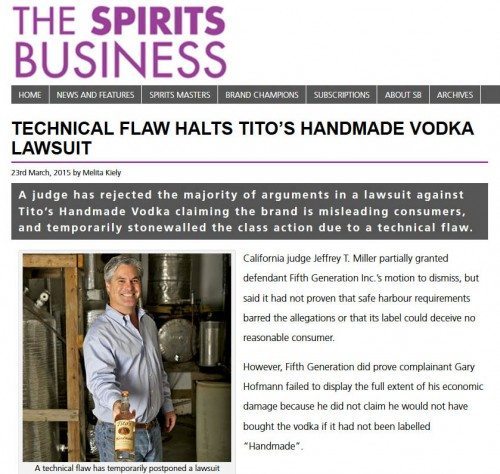3/23/2015 Update. Caution. The above headline seems fairly skewed. See below for what we think really happened last week. The case is not halted at all.
Tito had another bad day yesterday, this time in federal court in San Diego. This further makes it obvious that the world of labeling has changed markedly since the Supreme Court’s Pom decision of June 12, 2014. On March 18, 2015, Judge Jeffrey Miller (of the U.S. District Court for the Southern District of California) ruled that the Tito’s vodka case, relating to deception and the term “handmade,” should move forward. Since the case was filed on September 19, 2014, Tito has argued that the case should be dismissed.
The judge did agree with Tito on a few points, but agreed with the complainants on the larger points. Tito had argued that the case should not move forward because there was no real damage to anyone. In response, the court’s Order Granting in Part and Denying in Part Tito’s Motion to Dismiss, noted some consumers care a lot about “processes and places of origin” when deciding what to buy. By way of example, the court pointed to past controversies about kosher, halal, diamonds from conflict zones, and wine appellations.
Background about the case is here (the main complaints) and here (the main defense). This posting is a short version, and more commentary will be available at Wine & Spirits Daily, later today (or upon request). The nub of the matter is, the label and indeed the main selling proposition for Tito’s vodka, all the way back to its inception, center on its “handmade” aspects. This claim (the biggest word on the label) is now the subject of at least five lawsuits all over the U.S. They are 1) Hofmann (as here), 2) Pye (filed in federal court in Florida), 3) Aliano (filed in Cook County and removed to federal court), 4) McBrearty (filed in New Jersey state court and removed to federal court), 5) Cabrera (filed in San Diego, federal court), and 6) Grayson (filed in Las Vegas, federal court).
The Hofmann court said the class action claimants need not show that the vodka was defective or that the vodka was worth the price paid. Instead, the relevant inquiry is whether consumers were deceived about the “handmade” claim, and persuaded to buy on the basis of that deception. In essence, the judge is saying the plaintiffs made a mistake by arguing that class member would pay less – instead of arguing that they would not buy the product at all – but for the label claim at issue.
The Order has a funny typo on page 11 (stemming from the plaintiff’s brief), referring to the label term as “homemade,” when in reality the label shows the term “handmade.” A pillar of Tito’s defense, so far, is that TTB has approved the label on many occasions and after careful review. The court was not impressed by this point: “the court concludes that [Tito] has not shown that the safe harbor bars Plaintiff’s claims.” The court said TTB’s review was peripheral and informal at most, especially in view of the fact that TTB does not even have standards or rules for the term at issue.
The order seems careful and even-handed, but then seems to lean against Tito more, by saying:
In the court’s view, the representation that vodka that is (allegedly) mass-produced in automated modern stills from commercially manufactured neutral grain spirit is nonetheless “Handmade” in old-fashioned pot stills arguably could mislead a reasonable consumer. This is not, therefore, an issue that can be resolved at this stage.
Judge Miller further ruled that the 2013 Forbes article, that largely raised the questions about the Tito claim, is reliable enough, to form a basis for the allegations. Relatedly, the court was not too impressed with Tito’s argument that this article sufficiently alerted consumers that the claim might be dubious.
Finally, the court asserted that the complaint is not too vague for Tito to prepare an adequate response. The court said Tito’s “cogent” responses prove it. The court sided with the plaintiffs in most areas, but went against the plaintiffs in dismissing three major claims, on the basis that they were not pled properly. The court also, however, provided the plaintiffs with 14 days to fix those deficiencies and so this order is overwhelmingly helpful to the plaintiff side.
Simon Fleischmann (a top class action litigator at Locke Lord in Chicago) explained:
While this is a disappointing ruling from a defense standpoint, it is important to remember that this is just one trial court decision on the pleadings in what will likely be a broader war waged in several courts across the country on similar issues. And perhaps most importantly, the opinion emphasizes the highly individualized nature of that particular plaintiff’s purchasing decisions in a way that will make it difficult to certify a class of similarly situated consumers later on in the litigation.
Simon knows the context well. He is litigating very similar issues on behalf of Templeton Whiskey.
The court’s order is here.




Leave a Reply